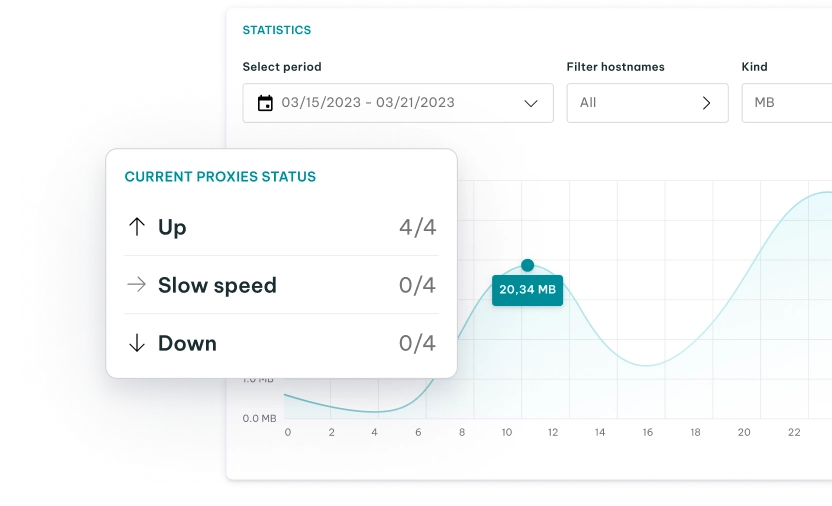What Is a Residential Proxy and How Does It Work?
Proxy fundamentals

Simona Lamsodyte
Key Takeaways
-
Residential proxy servers route your internet traffic through household devices to keep your activity private and avoid blocks.
-
Different types of proxies, like static, rotating, or mobile, serve specific needs such as ad verification or web scraping.
-
Choosing the right residential proxy provider is critical for getting a clean proxy pool and avoiding technical issues.
Residential proxies use IP addresses from Internet Service Providers (ISPs) assigned to household devices. They act as intermediary servers, forwarding your requests. Device owners voluntarily convert their phones, computers, and other equipment into residential proxies by installing internet-sharing or similar apps.
While the internet is being shared, residential proxies take the connection request from the source and forward it as their own. As such, the residential proxy IP address is used, keeping your connection safer and more private.
How Do Residential Proxies Work?
When a user installs an internet sharing application, the device will be able to act as a residential proxy. While the terms of service differ, most such providers enable the device to become a proxy only when the user isn’t actively using it.
Here are the steps on how it works:
- Gets real residential IP addresses. Residential proxies use IP addresses given to regular people by ISPs. So, these IPs belong to household devices in physical locations. When you connect through one, websites think you’re just another person at home using the internet.
- Masks your original IP. These proxies hide your actual IP address. Instead of showing your location or device, it shows the IP address of the house that the proxy uses. It helps you stay private online.
- Routes traffic through a real device. Your connection goes through a real device somewhere in the world. It’s like using a computer in someone’s house. Residential proxies make your web activity look natural without imposing on anyone’s privacy, since they’re getting paid for sharing their network connection.
Internet sharing applications are usually owned by a proxy server provider or by an independent entity. If an independent company owns it, it usually monetizes its residential proxy network pool by selling access to other businesses.
At the final stage of the transaction, businesses that need residential proxies purchase access to the pool of IP addresses from providers. They then use residential proxies for various use cases such as travel fare aggregation, ad verification, web scraping, or many others.
What Are Residential Proxies Used For?
Residential proxies are vital for common use cases that require frequent IP changes to avoid detection and other issues. For example, a device in New York, USA, will show information for that location even if the original source of the connection is from Europe.
Here are some use cases where residential proxies are most beneficial:
- Web scraping. Many websites block users who send too many requests, especially during a short period of time. Residential proxies make web scraping requests appear as normal traffic from different people. For example, if you’re gathering data for SEO monitoring from hundreds of pages, requests can be split over many IPs to avoid CAPTCHA or bans.
- Bypassing geo-restrictions. Some sites only show content in certain countries. With residential proxies, you can pick an IP from that country and unlock the content . It’s helpful in accessing region-locked websites that are blocked in your area.
- Testing ads. Companies use residential proxies to check how their ads appear in different cities or countries. They want to see if the right people are seeing the right ads. It helps marketers tweak ads for better results.
- Managing multiple social media accounts. Platforms like Instagram or Facebook often flag accounts that log in from the same IP address. Residential proxies help keep each account looking like it’s from a different person. This is extremely useful for agencies or businesses that handle many profiles.
- Sneaker and limited-item buying bots. Some people use residential proxies to purchase limited-edition items quickly. Bots with these proxies avoid bans and buy from stores like Nike or Adidas before items sell out.
- Private browsing. Residential proxies help people browse the web without giving away their real identity. Your IP stays hidden, so websites can’t track you that easily. Proxies aren’t a silver bullet for privacy, but together with other tools, they can make it much harder for sites to follow what you do online.
Types of Residential Proxies
Residential proxies are primarily defined by how the IPs are sourced, but that’s not all that defines a proxy server type. Things like rotation, access exclusivity, and others create different types of residential proxies that use residential connections instead of business-owned servers.
Rotating Residential Proxies
Rotating proxies automatically switch IP addresses upon each request or after a set amount of time or actions. Users usually connect to an endpoint that performs all of these actions according to their settings – rotating residential proxies are closer to a service than a different proxy type.
Rotating residential proxies are most commonly used when maintaining the same identity is not important, and ban rates are high. Public data web scraping, for example, is an everyday use case for these residential proxies.
Pros
- Lower block and CAPTCHA rates -Stronger detection protection
Cons
- Account session issues
- Less predictable performance
Learn more about IPRoyal residential proxy service:
Static Residential Proxies
Unlike rotating proxies, static proxies maintain the same IP address for a set duration. Static residential proxies are harder to acquire as companies usually have no control over the user’s device. Static proxies are therefore often sourced directly from Internet Service Providers or other companies.
Static residential proxies are often used where maintaining a single identity is essential. Managing multiple users on social media accounts is a classic use case for such residential proxies.
Pros
- Stable online identity
- Predictable performance
Cons
- Higher costs
- Less flexibility and scalability
Mobile Proxies
Mobile residential proxies (often called mobile proxies ) are sourced from mobile devices connected to the internet over cellular networks, such as 3G, 5G, or LTE. Usually, they are even less prone to getting banned and are considered more legitimate.
Mobile residential proxies are most popular when users need to access mobile-specific online data. Other than the device, they are functionally no different from regular rotating residential proxies.
You simply get mobile IP addresses from a mobile data provider, which you can use to access geo-restricted content, manage multiple accounts, or anything else that you may need.
Pros
- Authentic mobile user appearance
- Low block and detection rates
Cons
- Less consistent performance
- Limited control of IPs
Dedicated Residential Proxies
Dedicated residential proxies have IP addresses assigned to a single account. No one else can access the same proxy, giving you more control over the IP reputation and performance. However, shared residential proxies are significantly cheaper.
As such, dedicated residential proxies are most often chosen when cost savings are not the primary goal. They excel at cases like social media management, scraping, price monitoring, and others where the best performance and privacy are needed.
Pros
- Clean IP reputation
- Stable identity and performance
Cons
- High costs
- Less geographic diversity
ISP Proxies
ISP (or Internet Service Provider) proxies are a middle ground between datacenter and residential proxies. Often equated to static residential proxies, they use residential IP connections assigned to data center servers owned by ISPs.
The setup of ISP proxies allows them to blend the speed of a datacenter proxy and the legitimacy of a residential proxy , which gives them unique advantages and drawbacks. An ISP proxy network can be rather small, and it is also often the most expensive proxy server type, reserved for highly sensitive cases.
Pros
- Balances speed and IP legitimacy
- Static IP addresses
Cons
- Smaller IP pools
- Expensive
| Proxy type | Best for | IP rotation | Legitimacy level |
|---|---|---|---|
| Rotating residential proxies | Web scraping, price comparison, market research | Automatic (per request or time-based) | High |
| Static residential proxies | Social media management, streaming, browsing | Fixed IP for a set duration | High |
| Mobile proxies | App testing, web scraping | Dynamic (depends on network) | Highest |
| Dedicated residential proxies | Sensitive accounts, consistent identity | Fixed IP assigned only to you | High |
| ISP proxies | High-speed browsing, sneaker bots, streaming | Fixed (datacenter speed, residential IP) | Medium-High |
Residential Proxies vs Datacenter Proxies vs VPNs
One of the primary counterparts for residential proxies is datacenter proxies. Datacenter proxies are created in business-owned virtual servers in bulk, which makes them cheaper and faster. However, datacenter proxies are also generally easier to detect as they don’t have residential IP addresses.
| Proxy type | Residential proxies | Datacenter proxies | Premium VPNs |
|---|---|---|---|
| Price | Higher | Lower | Lower |
| Legitimacy | Higher | Lower | High |
| Speed | Lower | Higher | Medium |
| Reliability | High | High | High |
| Pool size | Higher | Lower | 1 shared IP per server |
While there are major differences in legitimacy, speed, and price, residential and datacenter proxies are suitable for different use cases.
- Residential proxies are better where ban and detection rates are high, such as SEO monitoring and web scraping.
- Datacenter proxies are more useful where speed and efficiency are more important, such as website change monitoring or email protection.
A VPN network is best for quick access to geo-restricted content, security on public networks, and anonymity. They are intended for everyday users who don’t need advanced functionality such as integrations with code, IP rotation, and other features.
As a result, if you’re going to scrape websites, a VPN won’t be enough for you. But if your goal is to watch a TV show on Netflix that’s not available in your country, you don’t need a proxy, as a reliable VPN is perfect for that.
Understanding Residential Proxy Pricing
Residential proxies are often considered the most premium proxy type because of the quality of the IP addresses. Compared to cheap datacenter proxies, sourcing residential addresses is much more complicated and expensive.
Providers have to pay more to maintain real consumer IP sources, such as internet sharing apps or deals with partner ISPs. They also operate complex infrastructure for cool-downs or rotation and manage higher abuse and compliance standards.
Due to the expenses involved, the dominant pricing model of residential proxies is based on bandwidth, where a higher GB count lowers the price. For example, IPRoyal’s 1GB residential proxy plan costs $7.00, while the 50GB plan lowers the price per GB to $4.90.
The bandwidth of other types of proxy servers, such as datacenter, is usually cheaper, so they are priced per use. However, some providers offer sticky sessions or static residential IPs that are priced per IP address purchased. The price of one ISP IP address currently starts from $1.80.
Generally, residential proxies justify their price when cheaper proxy types create more problems than value because of the risk of restrictions. Cases like scraping, multi-accounting, SEO monitoring, travel fare aggregation, and others frequently have such strict anti-bot and geo-restrictions.
How to Choose the Best Residential Proxy Provider?
Picking the best residential proxy provider for your needs is important. A bad one can slow you down, compromise your data-related ethics, get you blocked, or simply waste your money. Here are some things you should look for:
- Large and clean IP pool. Choose a provider that has a lot of residential IPs in many locations. The more clean IPs they offer, the better your chances of staying undetected.
- Good speed and uptime. Static and rotating proxies should be fast and stable. Look for providers that promise a high uptime (99% or more) and have servers that don’t lag or drop.
- Location coverage. If you need residential IPs from specific countries or cities, make sure the provider offers them. The more regions they cover, the more flexible your setup can be and the more geo-restrictions you can bypass.
- IP rotation and session control. The best providers let you choose between rotating residential proxies or sticky sessions. This matters when web scraping or logging into accounts.
- Clear bandwidth rules. Some proxy plans limit how much data you can use, and others limit how many IPs are available. Find clear information on whether your plan is pay-per-GB or unlimited.
- Customer support and documentation. A good provider offers fast support and clear guides to help you get started. Look for live chat, account managers, tutorials, and more.
- Pricing that fits your needs. Don’t go for the cheapest one just to save money. Check if the features match your needs. There’s no use in paying for locations or bandwidth that you won’t use.
IPRoyal can meet all of these requirements! Check out the pricing and features of our residential, ISP, Datacenter, and mobile proxies.
Are Residential Proxies Legal?
Yes. Besides countries like North Korea, there are no laws banning the use of proxies or residential proxies specifically. They are just another network tool providing you with an IP address for anonymity purposes. In a legal sense, proxies are no different than VPNs in routing internet traffic.
Due to being harder to detect, they might be associated with illegal or unethical activities. As with any other tool, the legality of proxy servers depends on whether you use them for legal use cases, like responsible scraping and ad verification.
The fact that residential proxies are a legal tool doesn’t make all your actions lawful. You must always consider whether your use case is legal. Conversely, the possibility of using residential proxies illegally doesn’t make them illegal or unethical, but the source of IPs might.
Ethical IP Sourcing
Ethical residential proxy sourcing means getting IPs from real users with explicit, informed consent and clear information on how their connection will be used. Requirements for ethical IP sourcing also include fair compensation and an easy opt-out mechanism.
As a proxy user, look for providers that are transparent about their IP address sources. IPRoyal is open about where our residential IP addresses come from and how anyone can use our partners to share residential proxies.
While there is no law regulating IP address acquisition for proxy use, reputational risks and reliability challenges should also be considered. Customers, especially businesses, don’t want to be associated with providers that acquire residential proxy IPs with malware or dark pattern consents.
Such practices might even result in legal exposure to the proxy network users, who might not know about it. Not to mention, unethical proxy servers are simply worse at performance and might be disconnected, blacklisted, or become generally unstable without any notice.
Conclusion
While residential proxies may seem like just a technical proxy distinction, they are often the best, albeit most expensive, option. Tasks like advanced scraping, travel fare aggregation, ad verification, and many others are powered by a quality residential proxy network from IPRoyal.
FAQ
How much does a residential proxy cost?
Most providers charge per GB. Prices often start around a few dollars per GB for small plans, and if you buy more data at once, the price drops. Some premium providers might charge more because their residential proxy server network is cleaner or faster. IPRoyal’s residential proxies, for example, start from $4.90/GB.
When to choose a residential proxy server?
You should choose a residential proxy server when you need to look like a real user. It’s best for tasks like managing social media accounts, price comparison, or scraping websites. If staying hidden and avoiding bans is your top goal, choosing residential proxies is the right move.
Why use a residential proxy instead of a datacenter proxy?
Residential proxies use IP addresses from real homes, so they look trustworthy. Datacenter proxies come from server farms and are easier for websites to spot and block. If you obtain residential proxies from a legitimate provider, you are less likely to get banned on strict websites.
Can I use residential proxies for scraping?
Yes, they are suitable for scraping. Since a residential IP proxy looks like a regular person browsing the web, sites don’t flag them as bots so easily. It lets you gather data without getting blocked too often or seeing too many CAPTCHAs.
How to tell if a residential proxy provider is ethical?
An ethical provider ensures their proxy network consists of consent-based and legally acquired IPs. Check public documents and news sources on whether a provider uses botnets, hidden software, or other unethical methods. The unavailability of such information is also a sign, as ethical providers like IPRoyal are transparent about their IP address sources .
What happens if a residential proxy gets detected or blocked?
The immediate effect is that access from the proxy IP becomes restricted, slow, or subject to other complications, such as CAPTCHAs. Detected residential IPs may appear on site-specific deny lists or public blacklists, which extend the restrictions elsewhere. Reputable providers apply various techniques to cool down proxy IPs to avoid such hurdles.
Is it legal to scrape public data with residential proxies?
Scraping publicly available data is generally legal, but not because of the proxies you use. Proxies are just tools, and the legality depends on what you scrape, how you access it, and applicable laws. As a general rule, check the terms of websites and avoid collecting personal data or content behind logins.


